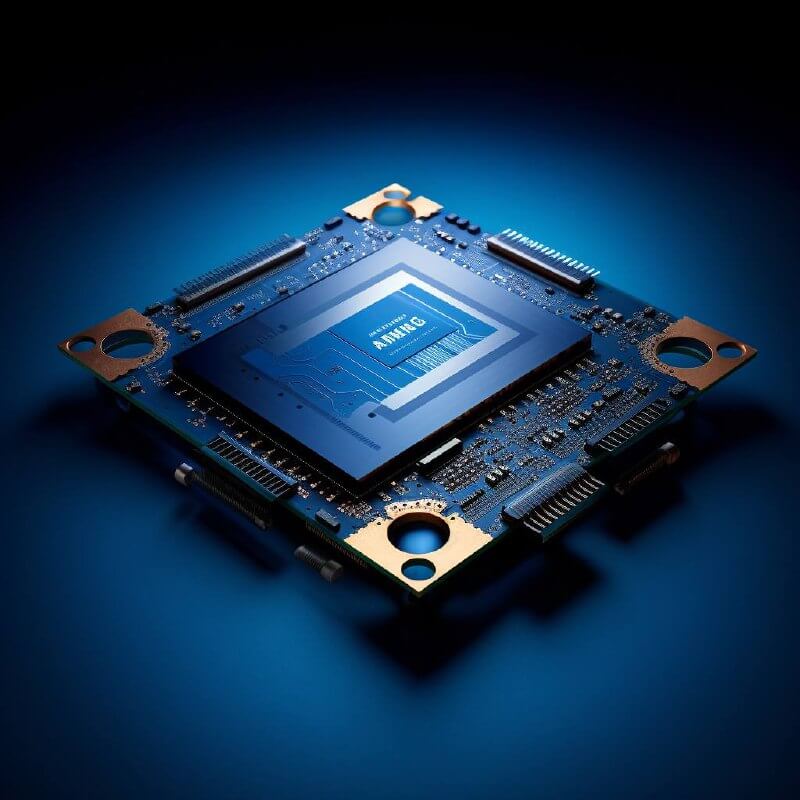In the ever-changing global technology market, SK Hynix Inc. and Samsung Electronics Co. have emerged as major players, with their fortunes closely linked to advancements in artificial intelligence (AI) technology. This year, there has been a noticeable difference in the stock performance of these two giants, with SK Hynix surging ahead by 67%, in contrast to Samsung’s more modest 24% increase.
The primary reason behind this disparity appears to be SK Hynix’s strategic focus on AI technology, particularly in the supply of high-quality, high-bandwidth memory (HBM) chips to Nvidia Corp.
SK Hynix’s impressive stock surge can be attributed to its strategic partnership with Nvidia Corp., a global leader in AI technology. This partnership involves the supply of premium high-bandwidth memory (HBM) chips, with SK Hynix establishing itself as a favored choice. The company’s commitment to this collaboration has paid off, positioning it as a frontrunner in the AI competition.
Conversely, Samsung Electronics has faced challenges gaining traction for its HBM offerings. While the company has made significant advancements in HBM technology development, it has encountered obstacles in finalizing agreements with key players in the AI industry, including Nvidia. Despite Samsung’s efforts to introduce advanced HBM3E chips and its plans for an HBM4 by 2025, it is playing catch-up in this critical sector.
Chips in high demand amidst sluggish market
SK Hynix and Samsung are navigating a demanding global market characterized by sluggish demand for traditional memory products. The prolonged industrywide downturn in smartphones has contributed to this decline, affecting a significant source of revenue for Samsung.
Nevertheless, the demand for chips to power generative AI services remains robust. As AI continues gaining prominence across various industries, the need for high-performance chips escalates. This demand surge is reflected in the performance of the Philadelphia Semiconductor Index, which has witnessed a notable 31% increase this year, outpacing gains in numerous benchmark indices.
The foundry challenge
Samsung has sought to diversify its revenue streams by offering contract chip-manufacturing services. However, in this domain, it faces stiff competition from Taiwan Semiconductor Manufacturing Co. (TSMC), which dominates the foundry business. TSMC has played a pivotal role in producing AI processors for companies like Nvidia, placing Samsung at a competitive disadvantage.
Advancements in HBM technology: SK Hynix’s leading edge
High-Bandwidth Memory (HBM) technology is a pivotal element in the AI competition, as it offers optimized performance for AI accelerators. SK Hynix, often regarded as a “pure-play” memory manufacturer, has led in developing the latest generation of HBM chips. The company successfully secured Nvidia as a major customer for its HBM3, giving it an edge over Samsung.
“This presents an unprecedented situation,” remarks Yoon Joonwon, a fund manager at DS Asset Management Co. “Everyone is focused on AI, as it represents the only sector with substantial demand.”
For Samsung, securing clients like Nvidia or Advanced Micro Devices Inc. is vital for its share price. However, some observers emphasize the importance of yield, which measures the efficiency of chip production from each batch of materials.
Anticipated earnings reports
Market analysts are keenly anticipating the forthcoming earnings reports from Samsung and SK Hynix, scheduled for later this month. Samsung’s preliminary results hinted at a more modest quarterly profit decline. Interestingly, according to Bloomberg-compiled data, both companies receive a similar number of buy ratings and no sell recommendations. Nevertheless, consensus price targets for Samsung indicate a potential gain of over 30% from its current level over the next 12 months, compared to approximately 20% for SK Hynix.
The path ahead
For market observers like Lee Seung-Woo, an analyst at Eugene Investment & Securities, while the potential for a shift in AI leadership exists, it won’t be an immediate change. “Samsung will not remain behind indefinitely,” says Lee, who rates the company as a buy. He anticipates that Samsung will likely introduce the next version of HBM3 within this year, narrowing the gap with SK Hynix to about four to five months. SK Hynix is expected to maintain its lead, but Samsung’s efforts are poised to yield results in the coming year.
The race for dominance in the AI sector has positioned SK Hynix and Samsung Electronics as formidable competitors. SK Hynix’s success in supplying premium HBM chips to Nvidia has significantly boosted its stock performance. Meanwhile, Samsung faces challenges in catching up in the HBM market, even as it strives to secure its position in the AI landscape. As both companies prepare to release their earnings reports, the tech industry and investors eagerly await the outcomes that will shape their future trajectories in the competitive world of AI technology.





